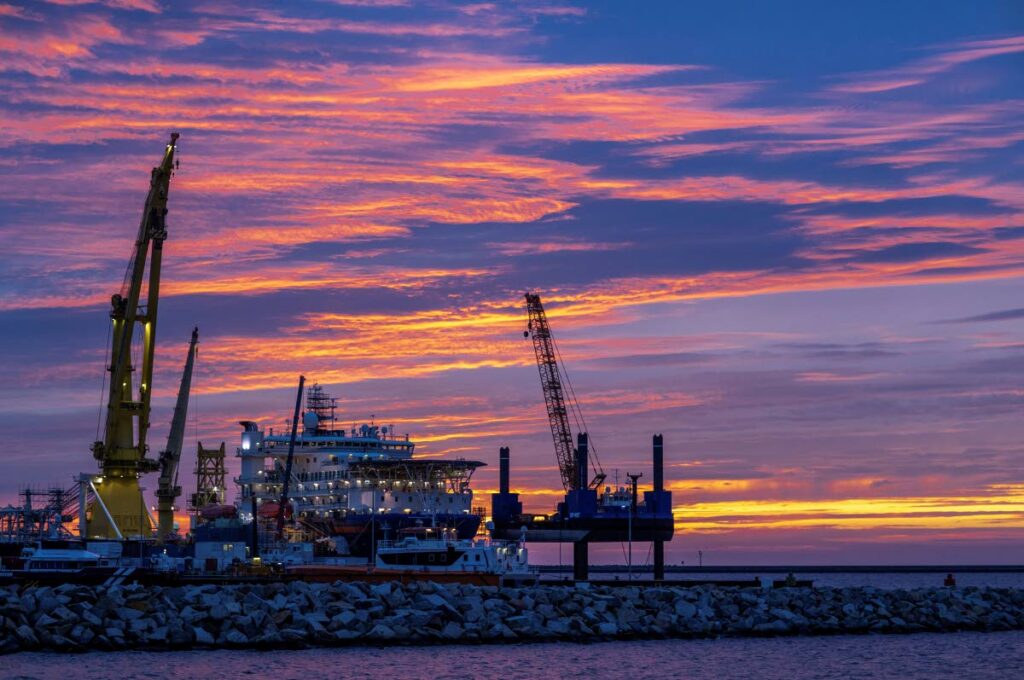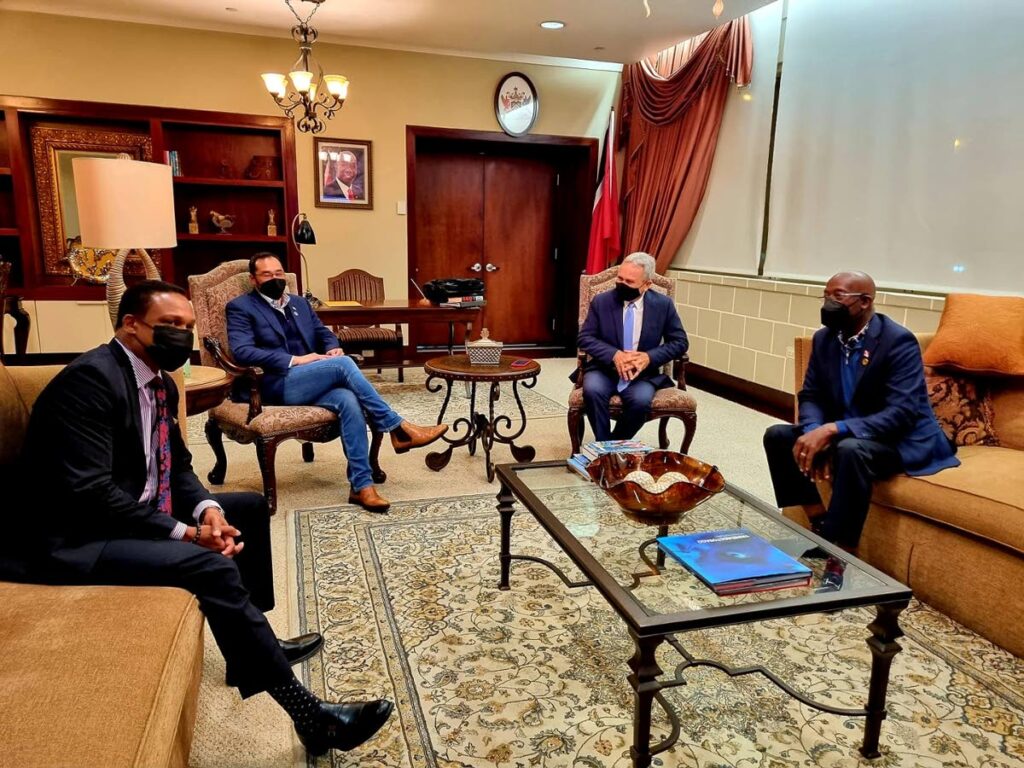Trade in times of war, pandemic: impact on Trinidad and Tobago's economy

Trade in the times of war, and a pandemic, adds to the volatility of the Trinidad and Tobago economy still heavily dependant on oil and gas. It's a scenario former ministers of finance and energy Winston Dookeran and Kevin Ramnarine consider in their look at the implications of the ongoing Ukraine-Russia crisis.
Dookeran takes a few steps back in his analysis of the oil and gas industry, addressing what he sees as slap in the face by TT's absence from last month's Guyana energy forum.
He told Business Day that TT’s decision not to attend was a missed opportunity for the sector and the country's economy.
Dookeran said, “Guyana offers tremendous opportunities for TT, and those opportunities need to be grasped, and therefore the energy conference that took place a week ago would have been a good forum to be able to assess how the energy sector is unfolding in Guyana and what role TT could play in supporting that effort, to the benefit of our country and indeed the region.”
Dookeran, also a professor of practice in international relations at UWI, added that because of TT’s vast history in the oil and gas industry, the knowledge it possessed was worth exploiting in markets that were now being introduced to the sector.
Those markets, he explained, needed TT’s expertise to manoeuvre the sector, in which this country can see tremendous benefits, yet TT was missing the boat.
“It is most unfortunate that our presence there was missing, because beyond missing the conference, it goes towards opening a serious dialogue of technical, logistics and diplomatic measures in which the Guyana oil find and possibilities can assist the whole region – and more specifically TT, with its abundant history and expertise of over 100 years in this field, in which Guyana is now beginning to walk, Dookeran explained.
The Guyana International Energy Conference and Expo took place on February 15-18 in Georgetown. It addressed future projects while highlighting upcoming business and investment opportunities.
Guyana recently entered the oil and gas market, and its significant finds of crude oil has opened opportunities for the country and the region’s growth and development.
Dookeran added that the Prime Minister’s visit to Doha, Qatar last week for the Sixth Summit of Heads of State and Government of the Gas Exporting Countries Forum (GECF) was not necessary and could have been handled by an experienced team from the Ministry of Energy and Energy Industries.
The GECF meeting addressed the expanded use of natural gas, increasing the share of natural gas in maritime and land transport and improving the international trade conditions for natural gas.

Dookeran said although TT has been a member state in the GECF since 2008, it diplomatic relations with the region, specifically Iran was not as strong as it should be.
“There was a memorandum for diplomatic relations between both countries and I have not heard or seen any serious attempts at trying to explore possibilities, and I think there are enormous possibilities.
“Unless the PM had some specifically established meetings, I do not see the need for him being there,” he said.
Dookeran added that while the GECF was a platform for networking and global market evaluation, TT’s presence should have been felt at both energy conferences.
“TT should be there, but not at the expense of missing the Guyana conference. We could do both. They (government) could have sent a high-powered delegation to both.
“The country at this stage, given what is happening in the region, it is good for TT in jump-starting its economy from the fallout of the covid19 pandemic. Given the prospect that that could happen with collaboration with Guyana.”
He pointed out that Guyana was now looking for support and has invited expertise from the US, Ghana and yet none from TT.
“I find it amusing that they are not talking about bringing in expertise from TT, which has more experience than the places mentioned.
“I think we have good experience in moving from oil to gas, from gas to feedstock, from feedstock to ammonia and think there is a lot we discuss with them.”
At the Doha conference, Dr Rowley spoke about the state of the local energy sector, its restructuring of natural gas in supporting TT's petrochemical and liquefied natural gas (LNG) industries and the effects of shale gas from the US on the market.
He said restructuring Atlantic LNG will combat the challenges faced by upstream producers who have been experiencing higher prices to compensate higher production costs, and for the downstream producers to operate in a competitive global environment.

Rowley said, “The Government has been having dialogue with companies to ensure a more equitable sharing of LNG revenues.
“(Which provide) an opportunity to correct this inequality consequent on the pending expiration of LNG licenses and plans to restructure the LNG business in TT.”
Where shale gas was concerned, he said TT was disadvantaged, since the US was no longer the principal market for its LNG.
GECF member countries are Algeria, Bolivia, Egypt, Equatorial Guinea, Iran, Libya, Nigeria, Qatar, Russia, TT and Venezuela.
On the conclusion of the GECF summit, another disaster surfaced that has devastating effects for the world economy if pushed further. The Russia-Ukraine crisis, which has been brewing over the past eight years, has evolved into a full-scale war.
Economic and financial sanctions have been placed on Russia – the third largest oil producer in the world – by Canada, the US, the UK, the EU and Japan.
Dookeran said the ongoing Russia-Ukraine crisis meant without a doubt there would be a shortage of oil and gas, and this would put TT’s economy under more pressure.
“The question is how long this would last and whether it would be structural or temporary. The sanctions are going to aim at undermining the economy of Russia and if it happens, even partially, it will have the effect of further disruptions in the global supply chains.
“We have to find a way to handle the effects and fallout from the crisis. We do not have an option. Because oil and gas would rise, from TT’s point of view it is not all bad. It is not that we want to benefit from other people’s situation, but the reality is that it would be to our benefit.
"We have to be on the alert for the other challenges,” he said.
The role of the private sector, he added, would be critical in finding solutions, especially with the supply-chain challenges and asset price issues.
On Wednesday, the price of Brent crude oil was US$114.50, WTI crude oil was US$111.70 and natural gas was US$4.50 MMBtu.
TT’s revenue forecast for 2022 was based on an oil price of US$66 and a natural gas price of US$3.75, former energy minister Kevin Ramnarine reminded in his discussion with Business Day.
He explained that with the price surge, TT would surpass the assumed oil price and may surpass the natural gas price assumption, but there would be no boom in the sector.
“The oil price above US$50 per barrel means the Government will collect SPT (supplemental petroleum tax) from most oil production, and above US$75 per barrel, it collects SPT from small onshore producers. This increase in price means companies like Heritage, Perenco and Trinity have more free cash flow, which can be used for reinvestment in drilling. However, the SPT remains an obstacle to investment and the industry expects the Minister of Energy to address this soon.
“The Government expected to collect $43.3 billion in revenue in 2022, I don’t see them falling below this forecast figure, but I don’t see it going much higher. In short there is no 'boom' effect, because booms are periods where we have a price spike and a production ramp-up," Ramnarine explained.
He added that with ammonia priced at US$1,085 per tonne it was expected to climb higher in coming weeks as Russian ammonia exports via the Ukrainian port of Yuzhnyy have been suspended, and upstream companies that sell natural gas to the NGC will benefit significantly.
“It will also benefit the NGC. The price the NGC realises for the natural gas it sells to the ammonia plants at Point Lisas varies with the price of ammonia. Overall, high ammonia prices are good for TT, given our strong position in the ammonia business, although that position has been weakened due to lower natural gas supply,” Ramnarine said.
He also pointed out that the Russia-Ukraine crisis will cause European countries to increasingly lean towards LNG, in which TT was still a major player.
Unfortunately, Ramnarine said, the closure of Train 1 and reduced production from Trains 2, 3 and 4 owing to lower natural gas supply has set back TT, and the benefits in the area would be minimal.
“Given the higher natural gas prices all over the world, TT should experience a bump in LNG-related revenue. However, this will be tempered by lower LNG production and the closure of Train 1. Our low natural-gas production means we are not poised to reap the full benefit of higher prices.”
A close eye should be kept on the fuel subsidy and food prices, Ramnarine said.
The issue of fuel subsidy, he said, was compounded by the importation of transportation fuels and much more was being paid for these products.
Ramnarine called on the Government to state its policy position on the fuel subsidy especially since the planned liberalisation of the retail of petroleum markets has been delayed.
Last Thursday, the Minister in the Ministry of Finance Brian Manning said the Russia-Ukraine crisis was closely being monitored in areas such as oil and gas, food and the effects of the sanctions placed Russian oil.
“There has already been an increase in oil and gas prices globally and that should benefit our economy. The supplemental petroleum tax has also kicked in and that should also generate additional income.
“Unfortunately, increased energy prices globally can lead to an increase in the cost of imported goods, due to the higher cost of production and transport.
“Russia, as you know, is one of the largest oil producers in the world, and it is possible that several of the largest energy consumers will implement embargoes and other sanctions on Russian oil,” he said.


Comments
"Trade in times of war, pandemic: impact on Trinidad and Tobago’s economy"